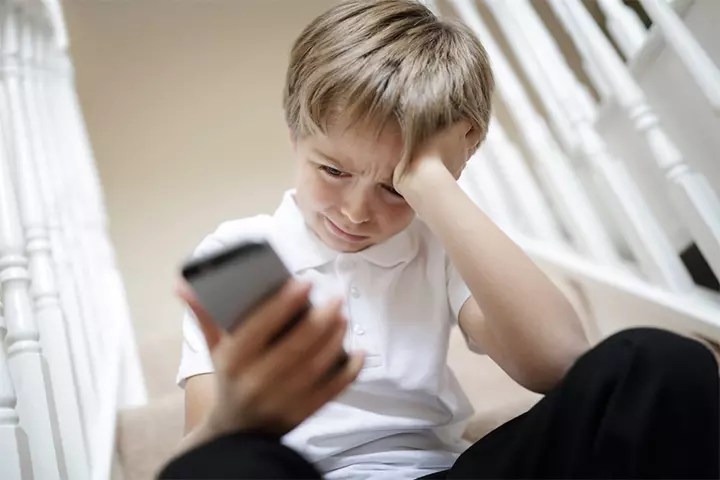
Image: Shutterstock
Most of us are familiar with the term “bullying” because it has been around for ages. On the other hand, “cyberbullying” is the new kid on the block. And it is much worse than just regular bullying. In today’s day and age, almost every child or teenager has easy access to the internet. On the internet, there is a lot less control of what goes around. When a bully decides to bully you on the internet by saying mean things or putting up funny or inappropriate pictures and videos, you can’t precisely control how many people it can reach. Within seconds, thousands of people will be able to read the inappropriate comment!
If your child is at the receiving end of such insensitive acts, they are bound to feel helpless and upset. This can take a toll on their mental and physical health. It can also affect their academics and social circle. As a parent, you are in the best position to help your child come out of this mess. To do that, you first need to watch out for the signs which indicate that your child is a victim of cyberbullying.
In most cases, children refrain from telling their parents they are being bullied for fear of being reprimanded or judged. So parents must put effort to observe their children and be aware of the signs to watch out in case their children are going through something horrible. So, without further ado, let’s get started on the most common signs that indicate that your child is cyberbullied.
1. They Act Weird Around Technology

Image: Shutterstock
It is normal for children to be on their phones, laptop, or tablets constantly. The chances are that your child too, just like their friends and peers, is almost always hooked to some form of technology. But if you notice that they have suddenly begun to act weird around technology, then it could be that something is off. Observe if they seem anxious when they get a notification, don’t spend as much time on their phones as before, or appear to be acting evasive every time they get a call. This can be a clear sign that they are going through something which is causing them acute fear and anxiety, and the earlier you address it the better.
2. Their Sleep Patterns Have Changed

Image: Shutterstock
Your sleep patterns can say a lot about your mental and physical health. Watch out whether your child is experiencing irregularities or a lack of sleep. It could also be that they fall asleep at their regular bedtime but are unable to have a restful sleep. It is common for those being bullied to experience irregular sleep patterns. In some cases, children fall asleep on their desks at school as they haven’t had enough sleep the previous night. Sometimes, they may also experience bedwetting when asleep (1). In worse cases, they could be having nightmares and troubled sleep where they scream and make noise. If you observe such behavior, have a discussion with them or consult a counselor.
3. Changes In Appetite

Image: Shutterstock
A loss of appetite is another common sign that could indicate that your child is upset. But it can go the other way as well, where they begin to overeat or stress eat. Some children end up with eating disorders such as bulimia and anorexia when they are being bullied, especially if the context of bullying revolves around their body weight (2). When your child is faced with this problem, chances are that a simple conversation with them will not fix the issue. Those suffering from body image issues have great trouble accepting themselves. Over time they lose confidence and focus, be it in their hobbies or studies. Parents would have to seek help from counselors in gradually helping their children in this. Expecting to solve the problem quickly is unrealistic and not advisable.
4. Apathy Or Loss Of Interest In Activities They Once Liked

Image: Shutterstock
Your child is probably going through something if they suddenly lose interest or stop caring about activities or things that they once loved to indulge in. It could be a lack of interest in their favorite sports or movie series, or they may withdraw from their social circles or settings they once enjoyed being a part of. If you start noticing such a disinterested attitude in your child for a prolonged period, try to engage them in some recreation or maybe go out for some fun activities like movies or shopping. If you’re still not able to lift their mood, chances are that they are going through something that you would have to find out.
5. Trouble At School

Image: Shutterstock
Children who are being bullied or cyberbullied often show a dip in their academic performance. The Federal Commission On School Safety conducted a study, and it was concluded that more than sixty percent of the children being bullied often suffered academically (3). Watch out for signs that your child is slacking off in school. Be patient with them as this is not them being lazy; this is them struggling with a problem they are unable to speak about.
6. Low Self Esteem

Image: Shutterstock
Children who have been bullied often end up with low self-esteem instead of other kids their age who have not been bullied. You can identify the signs of low self-esteem in the way your child talks or behaves (4).
7. Physical Signs

Image: Shutterstock
While cyberbullying often takes a toll on your mental health, it can also cause many problems that manifest physically. Your child may experience stress, headaches, stomach aches, and a perpetual feeling of fatigue.
Identifying the signs that your child is being cyberbullied is the first step in helping them overcome such a problem. It is essential to have an honest conversation with your child, one that does not rub them on the wrong or make them feel worse. Let them know that help is available and that no matter what, this too shall pass. Have you experienced cyberbullying yourself, or has your child been a victim of it? Let us know how you handled the situation in the comments below!
References
- Bullying sleep/wake patterns and subjective sleep disorders: findings from a cross-sectional survey
https://pubmed.ncbi.nlm.nih.gov/24417522/ - Policy Actions to Address Weight-Based Bullying and Eating Disorders in Schools: Views of Teachers and School Administrators†
https://onlinelibrary.wiley.com/doi/abs/10.1111/josh.12401 - Federal Commission on School Safety
https://cyberbullying.org/federal-commission-on-school-safety - Self-Esteem and Cyberbullying
https://cyberbullying.org/self-esteem-and-cyberbullying
Community Experiences
Join the conversation and become a part of our nurturing community! Share your stories, experiences, and insights to connect with fellow parents.












